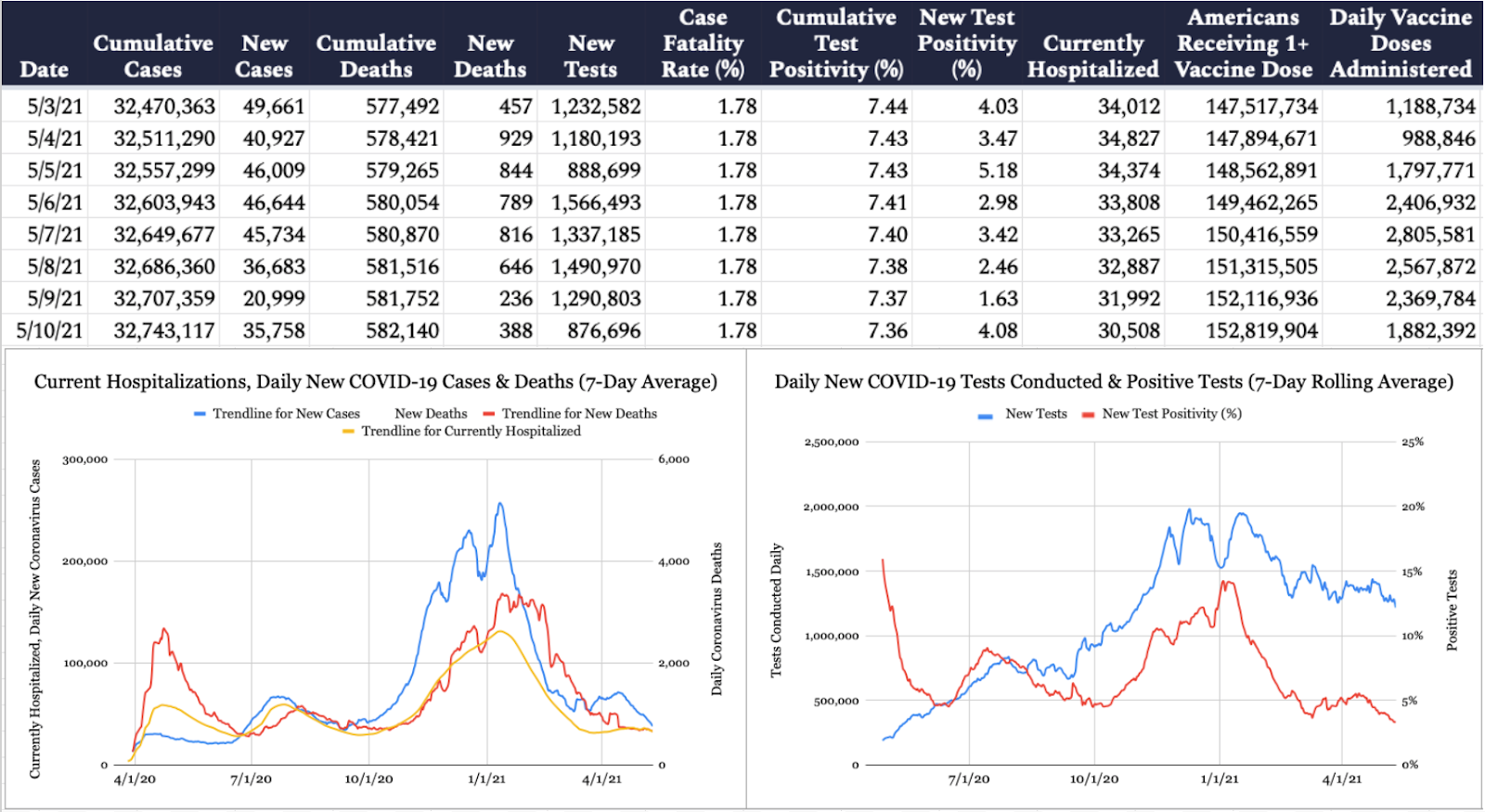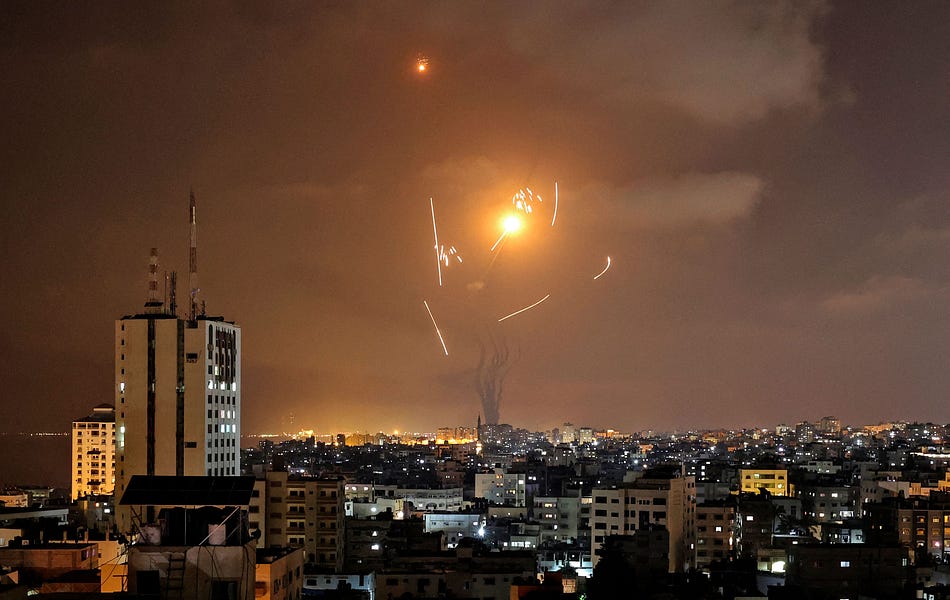Happy Tuesday! Apparently today is National Eat What You Want Day, the “one day a year of eating with no regrets.” You can eat what you want the other 364 days, too, but you have to regret it.
Quick Hits: Today’s Top Stories
-
The Food and Drug Administration on Monday authorized the Pfizer-BioNTech COVID-19 vaccine for emergency use in adolescents ages 12 through 15.
-
The FBI confirmed on Monday that the DarkSide hacking group was responsible for the ransomware attack on Colonial Pipeline over the weekend. Deputy National Security Adviser Anne Neuberger said the administration believes DarkSide to be a “a criminal actor” rather than a state-sponsored one, but is investigating further. Colonial said in a statement yesterday they hope to “substantially” restore operational services by the end of the week.
-
U.S. Coast Guard ships on Monday fired around 30 warning shots at Iranian Islamic Revolutionary Guard Corps Navy (IRGCN) fast boats in the Strait of Hormuz, the Pentagon said yesterday. A Defense Department spokesman said 13 IRGCN boats got within 150 yards of six U.S. Navy vessels.
-
The White House said yesterday the Department of Labor will both “reinstate work search requirements for [unemployment insurance] recipients” and clarify UI rules to make clear “workers may not turn down a job due to a general, non-specific concern about COVID-19 and continue to receive benefits.”
-
Glenn Youngkin, the former CEO of a private equity firm, won the Republican nomination in Virginia’s gubernatorial race, outpolling fellow businessman Pete Snyder in the ranked-choice, convention-style primary election.
-
The Department of Health & Human Services announced on Monday it will interpret Title IX’s prohibitions on sex-based discrimination to include sexual orientation and gender identity, opening hospitals up to possible penalties should they decline to perform “gender-transition procedures” for transgender people.
-
The United States confirmed 35,758 new cases of COVID-19 yesterday per the Johns Hopkins University COVID-19 Dashboard, with 4.1 percent of the 876,696 tests reported coming back positive. An additional 388 deaths were attributed to the virus on Monday, bringing the pandemic’s American death toll to 582,140. According to the Centers for Disease Control, 30,508 Americans are currently hospitalized with COVID-19. Meanwhile, 1,882,392 COVID-19 vaccine doses were administered yesterday, with 152,819,904 Americans having now received at least one dose.

Clashes in Jerusalem
Gaza militants launched rockets toward Jerusalem Monday evening as thousands of Israelis marched through the holy city in celebration of Jerusalem Day, a holiday marking the reunification of the city in the aftermath of the 1967 Six-Day War. An additional 200 strikes—also claimed by Hamas—were launched into Israeli territory, leading Israeli Defense Forces (IDF) to retaliate with dozens of their own strikes targeting Hamas operatives and facilities. The Palestinian Health Ministry said the Israeli strikes killed 24 people—including nine children—and injured more than 100.
The exchange of fire comes against a backdrop of escalating violence within Israel’s capital, which peaked Monday after weeks of ongoing clashes between Israeli police officers and Palestinian protesters.
Hamas’ strikes on Jerusalem, the first of their kind since 2014, followed two ultimatums from the terrorist organization urging Israeli security forces to withdraw from the Temple Mount, which is considered the holiest site in Judaism and the third-holiest site in Islam. Police entered the compound and its Al-Aqsa Mosque early Monday morning after rioters lobbed rocks and other makeshift weapons from within the holy site.
The ensuing fighting—during which Israeli officers deployed tear gas, rubber bullets, and flash grenades—resulted in upwards of 300 Palestinian injuries. Israeli forces also sustained at least 20 injuries in the commotion.
Monday morning’s clashes followed several days of demonstrations throughout the city over the Israeli government’s planned eviction of six Palestinian families from their homes in East Jerusalem’s Sheikh Jarrah neighborhood. Israel’s Supreme Court said Sunday that its decision regarding the evictions, originally scheduled to be released Monday, would be postponed until further notice.
Weeks earlier, police cordoned off East Jerusalem’s Damascus Gate plaza ahead of Ramadan, prompting widespread protests in response to a perceived effort by Israelis to impede Muslim religious and social gatherings. Together, these new points of conflict—along with other long-brewing tensions—created a perfect storm for sectarian violence to erupt once again in Israel’s capital city.
“The violence in Jerusalem is ostensibly the manifestation of a long list of Palestinian grievances, and a frustration with what they perceive as Israeli efforts to continue to displace Arabs from their homes,” Carmiel Arbit, a senior fellow for Middle East programs at the Atlantic Council, told The Dispatch. “But it is perhaps best viewed as a confluence of issues: I would start by looking at the protests that took place in Jaffa in April over gentrification, then the protests in Jerusalem and anticipation over the now-delayed Sheikh Jarrah decision.”
“Tensions always run higher around the holidays, especially when it relates to access to holy sites,” Arbit added. “Combine that with disillusionment over the purported halting of Palestinian elections over East Jerusalem, the emboldening of Israeli extremists in the last election, the violence that has unfolded comes as little surprise.”
In a Jerusalem Day Ceremony speech delivered Monday, Israel’s Prime Minister Benjamin Netanyahu maintained that the Israeli government will “respond with great force” to protect its citizens. “Whoever attacks us will pay a heavy price,” he declared. “I say to you, citizens of Israel, the current conflict could continue for some time. We do not seek escalation, but whoever chooses to escalate will feel the weight of our arm.”
“The test of leadership requires that the right decisions be made even when they are not understood at any given moment and their justification becomes clear later on,” Netanyahu added.
The UN Secretary-General’s office on Sunday expressed its “deep concern over the continuing violence in occupied East Jerusalem, as well as the possible evictions of Palestinian families from their homes in the Sheikh Jarrah and Silwan neighborhoods,” urging Israel to “cease demolitions and evictions” and “exercise maximum restraint” amid protests.
State Department spokesman Ned Price, meanwhile, condemned Hamas’ rocket fire into Israel “in the strongest possible terms,” and insisted that the U.S. would remain “fully engaged” in the conflict moving forward.
Price’s comments followed a phone call between U.S. national security adviser Jake Sullivan and his Israeli counterpart Meir Ben-Shabbar on Sunday, in which Sullivan made clear the Biden administration’s prioritization of Israel’s safety in the region. He also reportedly conveyed “serious concerns about the potential evictions of Palestinian families from their homes in the Sheikh Jarrah neighborhood.”
The U.S.’s handling of the crisis could set the tone for its relations with Jerusalem going forward. “This will be the first real pressure test for the U.S.-Israel relationship under the Biden administration, which has made clear that a two-state solution, and support for Palestinian rights in addition to Israel’s security, will be central to their approach to the region,” Arbit said. “Thus far, the administration has called on both sides to take steps to deescalate the situation. Should things continue to escalate, they may choose to weigh in more forcefully.”
Worth Your Time
-
Remember Andrew Yang? We haven’t spent too much time on the New York mayoral race (we will when it gets closer!), but this profile of the frontrunner by Clare Malone in New York Magazine will bring you up to speed. “Yang’s surprising dominance hasn’t just been luck,” she writes. “He has cannily deployed his fame, charisma, and hustle, bringing his very modern celebrity to a field otherwise low on name recognition and charm. But another part of his success, perhaps more central than most voters realize, must be credited to his team of advisers and close supporters. Many of the city’s most well-connected, savviest strategists have bet on Yang, and in less than two months, eight years after rejecting the legacy of Bloomberg for someone defiantly to his left, New York may very well elect an heir to the billionaire ex-mayor’s worldview.”
-
We at The Dispatch have been lucky to be able to do most of our work from home the past year or so. But like so many other offices across the country, ours will finally be reopening soon. The question is: How much will we use it? In an essay for The Atlantic, Amanda Mull advocates a new post-pandemic equilibrium: Three days in the office, two at home. “WFHers have been working longer hours and more weekends than before the pandemic, and they’re more likely to report loneliness, depression, and anxiety than people working in person,” Mull notes. “At the end of April, nearly 66 percent of respondents to a Morning Consult poll said they wanted to return to the office as soon as possible. Half of remote workers even miss their commute. But these data aren’t as conclusive as they might look. In the same Morning Consult poll, 84 percent of respondents said they enjoyed remote work. Gallup found that remote workers reported better overall well-being and higher engagement than those in the office. Many office workers also seem to be more productive at home, even in the middle of a disaster.”
-
The seeds of former President Donald Trump’s stolen-election lies were planted a lot earlier than you might think. In the Washington Post, a team of reporters led by Emma Brown tell the story of Russell Ramsland Jr., a Republican businessman in Texas who began circulating theories of mass electronic vote manipulation back in 2018. “The enduring myth that the 2020 election was rigged was not one claim by one person,” Brown et al. write. “It was many claims stacked one atop the other, repeated by a phalanx of Trump allies. This is the previously unreported origin story of a core set of those claims, ideas that were advanced not by renowned experts or by insiders who had knowledge of flawed voting systems but by Ramsland and fellow conservative activists as they pushed a fledgling company, Allied Security Operations Group, into a quixotic attempt to find evidence of widespread fraud where none existed.”
Presented Without Comment
Also Presented Without Comment
Also Also Presented Without Comment
Toeing the Company Line
-
On Monday’s episode of Advisory Opinions, David and Sarah were joined by Federal Court of Appeals Judge Gregg Costa, who provides listeners his expert take on serial clerkships, amicus briefs, nationwide injunctions, and more.
Let Us Know
If you have the choice, how are you planning to balance office work and working from home post-pandemic? Have you enjoyed being able to take calls in your pajamas, or are you ready for cubicles and business clothes again?
Reporting by Declan Garvey (@declanpgarvey), Andrew Egger (@EggerDC), Haley Byrd Wilt (@byrdinator), Audrey Fahlberg (@FahlOutBerg), Charlotte Lawson (@charlotteUVA), Ryan Brown (@RyanP_Brown), and Steve Hayes (@stephenfhayes).







Please note that we at The Dispatch hold ourselves, our work, and our commenters to a higher standard than other places on the internet. We welcome comments that foster genuine debate or discussion—including comments critical of us or our work—but responses that include ad hominem attacks on fellow Dispatch members or are intended to stoke fear and anger may be moderated.
With your membership, you only have the ability to comment on The Morning Dispatch articles. Consider upgrading to join the conversation everywhere.